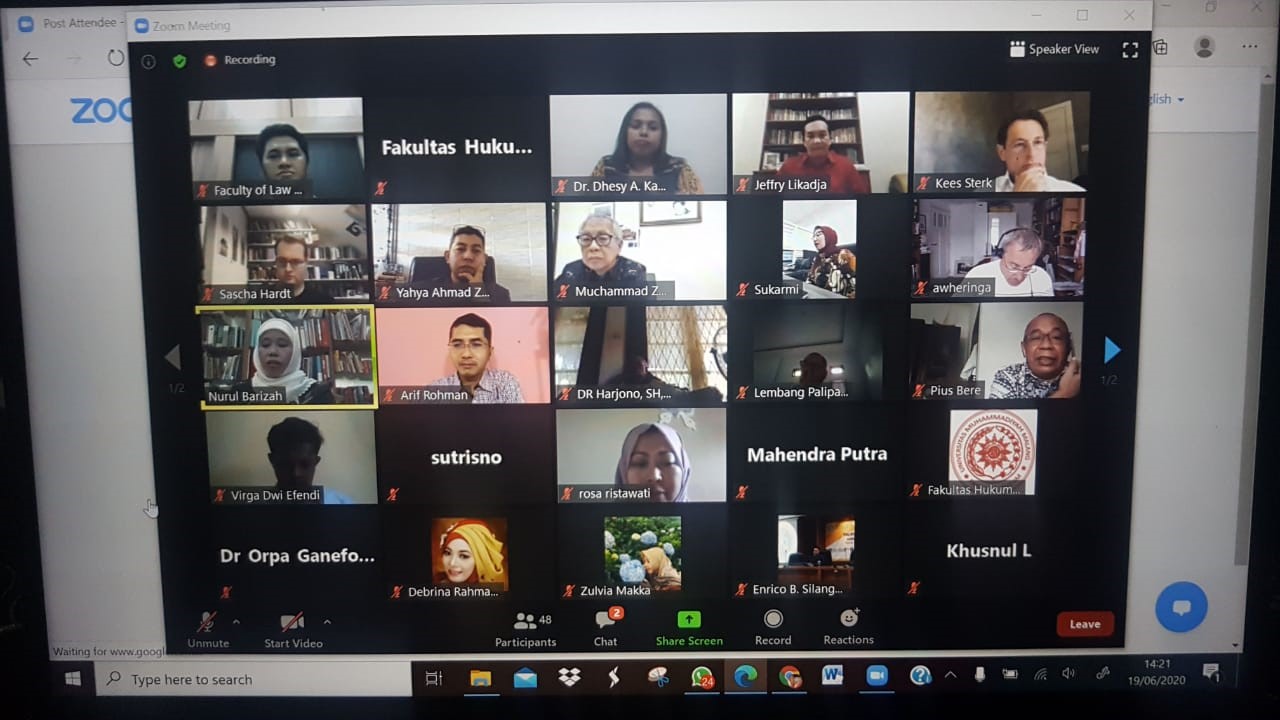UNAIR NEWS – Faculty of Law (FH) Universitas Airlangga (UNAIR) with five law faculties in Indonesia initiated an online FGD titled “Legal Ethics for Law School Curricullum” on Friday, June 19, 2020. The topic was inspired by facts of legal cases involving the legal professionals, such as lawyers, prosecutors and judges. The facts are the reflection of how legal education teaches and internalizes legal ethics in the curriculum and learning.
The online discussion opened by the Dean of Faculty of Law Nurul Barizah, Ph.D., presented three experts: Prof. Muchammad Zaidun, former member of the Constitutional Court Ethics Council; Dr. Harjono, Head of DKPP with experience as a Constitutional Court judge who is currently become the Chairman of KPK Monitoring Council; and Prof. Kees Sterk as Professor of Faculty of Law Maastricht University.
Starting the discussion, Prof. Zaidun explained that ethics in law faculty as a course was emphasized on the profession. Therefore, continued Prof. Zaidun, methodologically the learning must also be based on cases of professional ethics.
Although the focus is on professional ethics as reflected in the name of the course Legal Professional Ethics, Prof. Zaidun agreed that ethics in law is not only a matter of profession. “Therefore, it is necessary to explore the teaching of ethics in a variety of subjects by prioritizing ethical issues in the content of the lecture,” said the academician who was also involved in the development of the FH UNAIR curriculum.
Meanwhile, Dr. Harjono highlighted the ethics in the perspective of his experience so far. Pak Har said that we must be realistic that the profession of law graduates is very diverse, not entirely in the law enforcement profession. Therefore, according to him, legal ethics is not only a matter of profession.
He also firmly said that legal education is not only a matter of knowledge and skills. But how does legal education instill a basic understanding of justice. “This is the foundation for legal ethics,” said the alumni who used to be a lecturer at FH UNAIR.
On the other hand, according to Prof. Kees Sterk, all professions have values. The legal professions have their own value, such as Judges.
“Ethics must be taught practically. Students must be confronted with a real dilemma and must discuss it actively to sharpen their sensitivity, “he said.
In the end, Sujayadi S.H., LL.M, as a lecturer at UNAIR Faculty of Law added that the method of teaching legal ethics cannot be compared to other subjects. Growing student sensitivity is a fundamental thing that needs attention. “Legal ethics in learning also requires role models and stimulates students with cases that focus on the issue of justice,” he said.
The FGD is a collaboration between FH UNAIR and the Maastricht University Faculty of Law within the framework of Legal Education, Ethics and Professionalism (LEAP). It is a program in the Orange Knowledge Program (OKP) scheme with five faculties of law in Indonesia: Universitas Mulawarman; Universitas Haluoleo; Universitas Trunojoyo Madura; Universitas Nusa Cendana; and Universitas Borneo Tarakan.
“This discussion will not stop here, but it becomes an input for curriculum review and development that needs to be widely communicated and collaborated,” said LEAP-OKP Program Coordinator Dr. Rosa Ristawati. (*)
Author: Erika Eight Novanty
Editor: Binti Q. Masruroh





